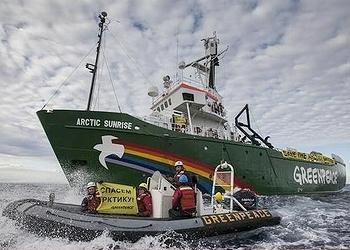
HAMBURG, Germany, November 22, 2013 (ENS) – In a binding ruling, the International Tribunal for the Law of the Sea today ordered Russia to release the Greenpeace ship Arctic Sunrise and the 28 activists and two freelance journalists who were onboard during a September protest of Arctic oil exploration.
In the case of the Dutch-flagged Arctic Sunrise brought by the Kingdom of the Netherlands against the Russian Federation, the tribunal ordered that upon the posting of a bond in the amount of 3.6 million euros by the Netherlands the activists, journalists and the ship must be freed.
Twenty-nine of the so-called “Arctic 30” have this week been granted bail by Russian courts, but one man, Colin Russell of Australia was denied bail and remains in a St. Petersburg prison.
The tribunal also ordered Russia to allow the vessel and the defendants to leave the country.

Russian authorities have charged the 30 men and women with piracy and hooliganism, and some of them may be charged with obstructing a law enforcement officer.
The arrests and seizure of the ship were triggered by a September 18 Greenpeace protest against the Arctic oil and gas drilling operations of Russia’s state-controlled oil and gas company Gazprom in the Pechora Sea off Russia’s northern coast.
Several activists attempted to climb the Gazprom oil platform in protest of the world’s first commercial drilling operation in the Arctic.
Greenpeace activist Sini Saarela of Finland, one of the two who scaled the platform, said just before her arrest, “This rusty oil platform is an Arctic disaster waiting to happen. We’re hundreds of miles away from emergency response vessels or independent observers, but right next to a pristine Arctic environment that’s home to polar bears, walruses and rare seabirds.”
Saarela is now free on bail.
In response to the tribunal’s ruling, Greenpeace International Executive Director Kumi Naidoo said, “Today is a historic day – a day when the fundamental rights of the Arctic 30 have been upheld by an international court of law. These 30 men and women were detained only because they stood up and courageously took peaceful action against Arctic oil drilling and to halt the devastating impacts of climate change.”
“Now that the Tribunal has ordered their release, I would remind you that President Putin recently said in a letter to the American people, ‘The law is still the law, and we must follow it whether we like it or not.'”
“Greenpeace would not disagree. The law is the law and this ruling goes a long way towards rectifying the great injustice against the Arctic 30 and we welcome it with open hearts.
Russia declined to appear before the tribunal to present its case, but the tribunal ruled that this non-appearance did not affect its ruling.
“The Tribunal notes that the Russian Federation was given ample opportunity to present its observations but declined to do so. The Tribunal considers that the Netherlands should not be put at a disadvantage because of the non-appearance of the Russian Federation in the proceedings and that the Tribunal must therefore identify and assess the respective rights of the Parties involved on the best available evidence.”
Jasper Teulings, general counsel at Greenpeace International, said, “In lodging this lawsuit, the Dutch government took a strong stance in support of the rule of law and the right to peaceful protest and for that we are grateful. Greenpeace is also a great believer in international law – after all one of the primary objectives of the UN Convention on the Law of the Sea is to protect the marine environment.”
“We thank the Tribunal and the Dutch government for bringing the freedom of our friends in Russia a significant step closer,” said Teulings. “Given that Russia is traditionally a strong defender of the importance of adhering to international law and of the UNCLOS regime, we at Greenpeace assume the Russian Federation will comply with the order.”
Naidoo said the actions of the Arctic 30 did more to help bring public awareness to the dangers of climate change than the UN climate negotiations in Warsaw which wrapped up today with little progress towards a legally-binding universal climate agreement.
“I have just come from the UN climate talks in Warsaw where governments again have failed to take action against climate change,” said Naidoo. “The Arctic 30 took action and it is time that governments acted with them.”
“It is time for the Arctic 30 to come home to their loved ones. It is time for the Arctic to be protected,” said the Greenpeace leader. “Thirty people stood up for seven billion people. We must stand with them.”
Copyright Environment News Service (ENS) 2013. All rights reserved.
© 2013, Environment News Service. All rights reserved. Content may be quoted only with proper attribution and a direct link to the original article. Full reproduction is prohibited.
